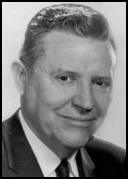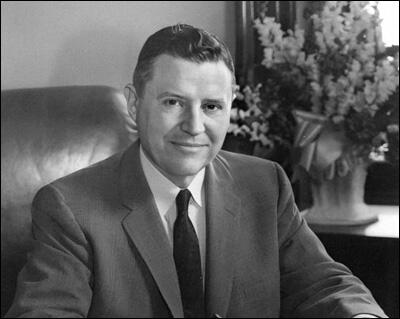Ralph Yarborough

Ralph Webster Yarborough, the seventh of nine children, was born in Chandler, Henderson County, Texas, on 8th June, 1903. After attending local schools he entered the West Point Military Academy in 1919 but dropped out the following year.
Yarborough was a school teacher in Henderson County for three years before moving to Germany where he was assistant secretary for the American Chamber of Commerce in Berlin. On his return he attended University of Texas Law School.
After graduating in 1927 he became a lawyer in El Paso. Over the next four years he won several cases against the Magnolia Petroleum Company and other major oil companies and successfully establishing the right of public schools and universities to oil-fund revenues. He also served as district judge in Austin (1936-41).
During the Second World War Yarborough, a member of the 97th Division, served in Europe and Japan. When he left the army in 1946 he had reached the rank of lieutenant colonel. After the war Yarborough became a lawyer in Austin, Texas.
A member of the Democratic Party Yarborough unsuccessfully challenged Governor Allan Shivers for the nomination in 1952 and 1954. Yarborough was one of the leaders of the progressive wing of the party. Shivers, on the right of the party, accused Yarborough of being in favour of racial integration and having support from the American Communist Party.
Yarborough, with the support of the trade unions, was elected to the United States Senate in April 1957. A left-wing member of the party, Yarborough was the only member of the Senate representing a former Confederate state to vote for every significant piece of civil rights legislation. This included the Civil Rights Act (1957) and Civil Rights Act (1960).

In the summer of 1963 President John F. Kennedy contacted Yarborough and asked him what could be done to help the image of the president in the state. Yarborough apparently told Kennedy “the best thing he could do was to bring Jackie to Texas and let all those women see her”. Kennedy had won Texas by only a small margin in the presidential election of 1960. It was believed that this victory was mainly due to the campaigning of his running-mate, Lyndon B. Johnson, who was the dominant political figure in Texas at the time. Kennedy believed that he needed to win Texas in 1964 if he was to be re-elected as president.
On 22nd November, 1963, President John F. Kennedy arrived in Dallas. It was decided that Kennedy and his party, including his wife, Jacqueline Kennedy, Vice President Lyndon B. Johnson, Governor John Connally and Ralph Yarborough, would travel in a procession of cars through the business district of Dallas. A pilot car and several motorcycles rode ahead of the presidential limousine. As well as Kennedy the limousine included his wife, John Connally, his wife Nellie, Roy Kellerman, head of the Secret Service at the White House and the driver, William Greer. The next car carried eight Secret Service Agents. This was followed by a car containing Lyndon Johnson and Ralph Yarborough.
At about 12.30 p.m. the presidential limousine entered Elm Street. Soon afterwards shots rang out. John Kennedy was hit by bullets that hit him in the head and the left shoulder. Another bullet hit John Connally in the back. Ten seconds after the first shots had been fired the president's car accelerated off at high speed towards Parkland Memorial Hospital. Both men were carried into separate emergency rooms. Connally had wounds to his back, chest, wrist and thigh. Kennedy's injuries were far more serious. He had a massive wound to the head and at 1 p.m. he was declared dead.
Within two hours of the killing, a suspect, Lee Harvey Oswald, was arrested. Throughout the the time Oswald was in custody, he stuck to his story that he had not been involved in the assassination. On 24th November, while being transported by the Dallas police from the city to the county jail, Oswald was shot dead by Jack Ruby.
After the death of John F. Kennedy, his deputy, Lyndon B. Johnson, was appointed president. Yarborough was a great supporter of Johnson's Great Society programs in education, environmental preservation, and health care. He also voted from the Civil Rights Act (1964)and the Voting Rights Act (1965). Yarborough was more critical of Johnson's foreign policy and was a strong opponent of the Vietnam War.
An advocate of preserving the environment, Yarborough sponsored the Endangered Species Act of 1969 and the legislation that established three national wildlife sanctuaries in Texas-Padre Island National Seashore (1962), Guadalupe Mountains National Park (1966), and Big Thicket National Preserve (1971).
Yarborough was a member of the Senate until he was defeated by Lloyd Bentsen in 1970. He now returned to work as a lawyer in Austin. He also served as a member of the State Library and Archives Commission of Texas 1983-1987.
Ralph Webster Yarborough died in Austin, Texas, on 27th January, 1996.
Primary Sources
(1) Hugh Aynesworth, JFK: Breaking the News (2003)
Liberal Ralph Yarborough, for example, detested centrists such as Connally and Johnson - and with some reason. The governor and the vice president were never seen doing the senator any favors. Just the opposite. On this trip they seemed determined to put Yarborough in his place.
Connally was scheduled to host a private reception for JFK at the governor's mansion in Austin that Friday night: Yarborough was absent from the guest list.
Yarborough's response to that snub: "I want everybody to join hands in harmony for the greatest welcome to the President and Mrs. Kennedy in the history of Texas." Then: "Governor Connally is so terribly uneducated governmentally, how could you expect anything else?"
On Thursday afternoon in Houston, Yarborough had defied Kennedy by refusing to ride in the same car with LBJ. He chose instead to be seen with Congressman Albert Thomas. In San Antonio that morning, Secret Service Agent Rufus Youngblood was gently nudging the senator toward Johnson's limo when Yarborough saw Congressman Henry Gonzalez, a political blood brother, and bolted toward him. "Can I ride with you, Henry?" he asked.
That evening, employees at Houston's Rice Hotel heard JFK and LBJ arguing over Yarborough in the presidential suite. Kennedy reportedly informed Johnson in strong terms that he felt Yarborough - who had much better poll numbers in Texas than Kennedy - was being mistreated, and the president was unhappy about that.
(2) Ralph Yarborough, interviewed on The Men Who Killed Kennedy – The Coup d'état (2003)
The Secret Service in the car in front of us [the car behind Kennedy’s car] kind of casually looked around, looked up at the back of them and were rather slow to react. We went under the overpass and as we came up on the other side, I could see then the President’s car. And there was [Clint] Hill whom I knew as a Secret Service man assigned to protect Mrs. Kennedy. He was lying across the back [of the car] to hang on with his arm over in there so he could hang on at that high speed. His face turned back towards us, just … agony; and beating with his hand [against the car] like a terrible thing had happened. I knew then that Kennedy’d been shot.
And within several minutes, we came to Parkland Hospital and the Secret Service immediately jumped out the minute Johnson – they practically pulled him out and formed a cordate around him, four or five, and one of them said "Mr. President." I knew then Kennedy was dead.
And I walked up to the car where Mrs. Kennedy was still there on the back seat, lying there with her head bowed over covering her husband’s head, his blood running down her leg and on her clothes, and twice saying, "They’ve murdered my husband. They’ve murdered my husband." It’s the most tragic sight of my life.
(3) The Texas Handbook Online (2002)
Yarborough defeated George H. W. Bush, future president of the United States, in the senatorial race of 1964. In his years in the senate Yarborough supported many of the key bills of LBJ's Great Society and pressed for legislative action in the fields of civil rights, education, public health, and environmental protection. He voted for the Civil Rights Act of 1964 and was one of only three southerners to support the Voting Rights Act of 1965. Yarborough served for years on the Senate Labor and Public Welfare Committee, of which he became chairman in 1969. He sponsored or cosponsored the Elementary and Secondary Education Act (1965), the Higher Education Act (1965) the Bilingual Education Act (1967), and the updated GI Bill of 1966. He was also an advocate for such public-health measures as the Occupational Health and Safety Act, the Community Mental Health Center Act, and the National Cancer Act of 1970. A strong supporter of preserving the environment, he co-wrote the Endangered Species Act of 1969 and sponsored the legislation establishing three national wildlife sanctuaries in Texas-Padre Island National Seashore (1962), Guadalupe Mountains National Park (1966), and Big Thicketqv National Preserve (1971). His interest in the preservation of Texas historical sites led him to sponsor bills to make Fort Davis, Jeff Davis County and the Alibates Flint Quarries national monuments.


